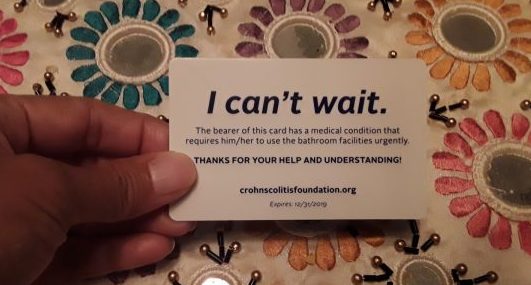Where is the bathroom? It’s one of the first questions memorized when learning a new language or traveling to another country.
In my column “Crohn’s Takes a Holiday,” I mentioned the value of clean public restrooms for the most private of purposes. Clean restrooms are a given for most people, and almost everyone can empathize with an IBD patient’s need for privacy.
Even before my Crohn’s diagnosis, when I needed privacy I made a conscious effort to use a restroom at least a floor above or below where my office was to avoid running into colleagues. If too many people were in the restroom, I would just wash my hands and leave immediately to find a less crowded one. If another person was already in a stall when I came in or someone walked in while I was in the middle of doing my business, I would sit quietly until they left. And, I’m sure everyone has encountered a “standoff,” or a “sit off” I suppose, when the person in the next stall is doing the exact same thing — waiting for you to leave so they can go in peace.
Private, or single-toilet, public restrooms are few and far between, and sometimes I can’t wait for privacy. However, clean restrooms are easier to find, and I’ve listed a few tips along with some of my favorite spots when traveling.
Favorite standbys
I can usually depend on restaurants to have adequate restroom facilities. Any establishment that requires a license to serve food and has regular health inspections should have clean restrooms. If I wouldn’t eat there, I’m definitely not going to check out the restroom out of fear of disgust and disease.
This is also the reason I avoid gas station restrooms, but I have a few exceptions to this rule when traveling through Texas and the southeastern United States. In Texas, spotting a red and yellow billboard featuring the head of a cartoon beaver is a welcome site. Buc-cee’s is not the run-of-the-mill gas station. The chain prides itself and actually advertises the cleanliness of the restrooms. The spacious bathrooms feature multiple stalls with doors that go all the way to the floor, so there’s some semblance of privacy. Even though the restroom is always filled with people, there are so many stalls that one can’t discern where any tell-tale noises or aromas are coming from. In addition to the restrooms, Buc-cee’s is a great place to pick up barbecue, drinks and gourmet coffee, snacks, fudge, camping supplies, and farmhouse-chic décor.
Unfortunately, except for one store outside of Mobile, Alabama, Buc-cee’s is only located in Texas. Stuckey’s, on the other hand, has more than 115 locations in 17 states, and it’s my next go-to when there’s not a Buc-cee’s within 25 miles. Also, stopping at Stuckey’s is a good excuse to buy a package of their famous divinity and pecan logs.
Another trustworthy spot for a bathroom break is the good old-fashioned rest area. However, not all rest areas are created equal. Through personal experience, I’ve discovered that the welcome centers and rest stops located right inside state lines are the most well-kept and cleanest. After all, what state doesn’t want to make a good first and last impression on visitors?
It’s the law
Not all businesses have public restrooms, and some actually post signs saying restrooms are for employees only. In these instances, IBD sufferers in the United States have some legal rights to gain access in the 16 states that have passed the Restroom Access Act, also known as Ally’s Law.
The law, named after IBD patient and advocate Ally Bain, falls under the American with Disabilities Act. The law requires that businesses with employee-only restrooms allow customers with medical conditions, including IBD, emergency access to the facilities. While the law may vary from state to state, the customer has the right to file a complaint with local law enforcement if denied access. Businesses found in violation of the law may be fined. Depending on the state, customers may need to show a doctor’s note or a bathroom access card as proof of medical need. I received my “I Can’t Wait” card through my annual membership with the Crohn’s & Colitis Foundation, but cards are available through the pharmaceutical company AbbVie and other organizations just by performing an internet search for restroom access cards.

While I would much prefer the privacy of my own bathroom, sometimes nature calls at the most inconvenient time and place. Having some options and knowing my rights make using public restrooms a little more comfortable and easier to deal with.
***
Note: IBD News Today is strictly a news and information website about the disease. It does not provide medical advice, diagnosis, or treatment. This content is not intended to be a substitute for professional medical advice, diagnosis, or treatment. Always seek the advice of your physician or other qualified health providers with any questions you may have regarding a medical condition. Never disregard professional medical advice or delay in seeking it because of something you have read on this website. The opinions expressed in this column are not those of IBD News Today, or its parent company, BioNews Services, and are intended to spark discussion about issues pertaining to IBD.

